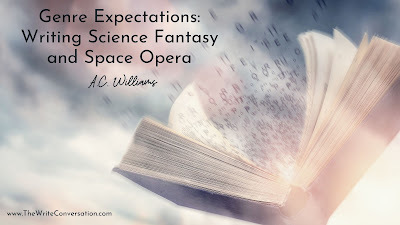Genre Expectations: Writing Science Fantasy and Space Opera

by A.C. Williams @ACW_Author
Where do you stand in the age-old debate between Star Trek and Star Wars? Are they science fiction? Or are they fantasy that’s just set in space?
There is nothing more annoying than listening to a roomful of nerds arguing over granular details that really don’t matter to a story’s reception, so we’re not going to do that. A good story is a good story, and in the end, it doesn’t really matter what its classification is.
Otherwise there wouldn’t be so many “weird” outliers that have hit the bestseller charts. Excellent stories supersede their genre’s perceived limitations.
But, genre matters immensely because how else will we market our stories? How else will we help our readers know if what we’ve written will suit their needs or not?
As stated in our foray into the difference between Romantic Fantasy and Fantasy Romance last month, declaring a genre is a promise you make to your readers. You have to deliver on that promise, or your audience will likely be disappointed. And a disappointed reader is rarely a repeat reader.
So what about science fiction? What about fantasy? In general, the lines between these two genres have started to blur in the last 10 to 20 years. Some of that is our own level of technology has achieved things that would have been considered fantastical 50 years ago. What used to be considered fantasy (impossible) is now ordinary.
Granted, there are still general elements and characteristics that will distinguish science fiction from fantasy. In most cases, if you find a story with a dragon in it, you can assume it will be a fantasy. If you find a story with a spaceship in it, you can assume it will be science fiction.
The problem is that in our current storytelling culture, where tropes cross-pollinate and hybrid genres are more popular than ever, how can you tell the difference anymore? And does it even matter?
Well, yes, it does. It matters a lot.
Let’s go back to our first question: Star Wars versus Star Trek.
They both have spaceships. They both feature epic space battles. They both include alien species. They both incorporate some fantastical elements (for Star Wars, it’s the Force; for Star Trek, it’s Q and the Q Continuum). So since they are similar, don’t they belong in the same genre?
No.
Very much like the difference between Fantasy Romance and Romantic Fantasy, the dividing line between Science Fantasy and Space Opera is the driving core of the story itself.
Star Trek is focused on the curiosity of the human spirit. Exploration and experimentation. Learning about new cultures and the relationships between vastly different people groups. And while there are some elements of the obviously fantastic, most Star Trek content remains solidly in the scientifically probable category. The purpose of Star Trek stories is understanding the universe scientifically.
Star Wars, on the other hand, is generally focused on a philosophical understanding of the universe. With the exception of a few examples (i.e. Andor, Solo, The Bad Batch, etc.), you cannot separate Star Wars from it’s highly spiritualized concept of a Higher Power. The Force. It has shaped every characteristic of every Star Wars story in some way.
If you were writing a Star Wars story, and you focused the plot on whether or not the Wookies had the technology to stop a natural disaster—it wouldn’t really fit in the canon of Star Wars. Nobody is really interested in Wookie technology. They live in giant trees. But when there is a potential to feature a story with a Wookie Jedi? That’s fascinating. A Wookie with a lightsaber and the power to manipulate objects with the Fore?
If you were writing a Star Trek novel, and you focused your plot on the crew accidentally stumbling into a world controlled by magic, there are ways you could make it fit. But their solution to whatever problem they encounter would need to be based on science. You couldn’t give Mr. Spock magic powers. You couldn’t allow Lt. Commander Data to suddenly, magically have control of his synthetic emotions. There would have to be a scientific explanation. (And a bar-room brawl. Just saying.)
This is the difference between Science Fantasy (Star Wars) and Space Opera (Star Trek). They are similar, yes, but they speak to very different audiences.
So, if you want to dive into the nerdy world of space adventure stories, keep these distinguishing factors in mind.
Science Fantasy and Space Opera will both include elements of science and technology. Since both are considered subgenres of “soft” science fiction, they will be more stories about adventure and relationships. Most times, they’ll take place in space or on another planet, feature alien species, advanced technologies, and even time travel, although that’s another topic for another day. You might even encounter religious systems or belief systems in both subgenres.
The primary difference you’ll need to remember is that Space Opera generally focuses on how a solution to the problem can be achieved. In Science Fantasy, how you reach the solution will be less important than why it matters, both to the individual characters and the universe as a whole.
TWEETABLEGenre Expectations: Writing Science Fantasy and Space Opera from @ACW_Author on @EdieMelson (Click to Tweet)
 Award-winning author, A.C. Williams is a coffee-drinking, sushi-eating, story-telling nerd who loves cats, country living, and all things Japanese. She’d rather be barefoot, and if she isn’t, her socks won’t match. She has authored eight novels, two novellas, three devotional books, and more flash fiction than you can shake a stick at. A senior partner at the award-winning Uncommon Universes Press, she is passionate about stories and the authors who write them. Learn more about her book coaching and follow her adventures online at https://www.amycwilliams.com.
Award-winning author, A.C. Williams is a coffee-drinking, sushi-eating, story-telling nerd who loves cats, country living, and all things Japanese. She’d rather be barefoot, and if she isn’t, her socks won’t match. She has authored eight novels, two novellas, three devotional books, and more flash fiction than you can shake a stick at. A senior partner at the award-winning Uncommon Universes Press, she is passionate about stories and the authors who write them. Learn more about her book coaching and follow her adventures online at https://www.amycwilliams.com.
Published on February 29, 2024 22:00
No comments have been added yet.



